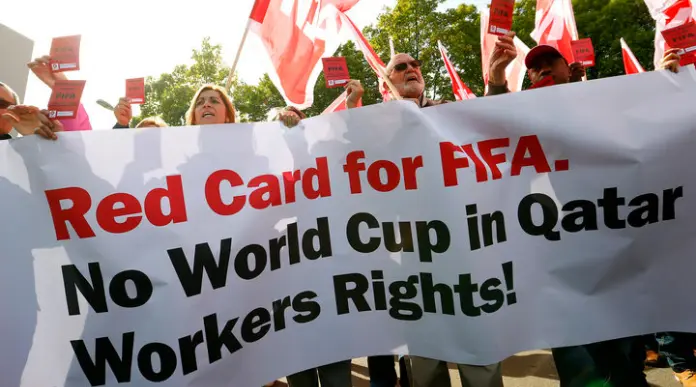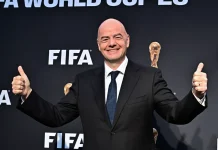The 2022 FIFA World Cup in Qatar dazzled fans worldwide with its high-stakes matches and lavish venues. But behind the scenes, the tournament was marred by an unsettling pattern: the systematic silencing of dissent and suppression of criticism, especially concerning human rights. As the spectacle unfolded, allegations against FIFA—football’s governing body—ranged from complicity in labor rights violations to stifling political expression by teams, fans, and activists.
The Human Cost: Migrant Worker Deaths in Qatar
Systemic Labor Exploitation and Grim Death Toll
When Qatar won the bid to host the 2022 World Cup in 2010, it triggered an unprecedented building spree requiring massive labor. This labor came predominantly from vulnerable migrant populations—many from South Asia—working under dire conditions. The International Trade Union Confederation (ITUC) estimated that 4,000 workers would perish before the tournament kicked off. Subsequent reports indicated that more than 6,500 migrant workers had died in Qatar since 2010, with causes ranging from heat exhaustion to unexplained cardiac arrests.
Yet, FIFA remained largely silent. Despite public commitments to uphold international human rights standards, critics accused FIFA of neglecting its duty to enforce those principles among host countries and partners. The glaring disconnect between FIFA’s professed values and its actions raised serious questions about its priorities.
FIFA’s Directive: “Focus on Football”
Infantino’s Letter and Global Criticism
In a move widely condemned as tone-deaf, FIFA President Gianni Infantino sent a letter to participating nations ahead of the 2022 tournament urging them to “focus on football” and avoid engaging in “ideological or political battles.” The letter, sent to countries including Germany, Australia, Denmark, and the U.S., was interpreted as a direct attempt to suppress any form of protest or commentary on Qatar’s labor record, gender inequality, or LGBTQ+ rights.
This stance was not only controversial but revealing. FIFA’s choice to discourage political expression in favor of a sanitized, apolitical version of football underscored its preference for commercial stability over ethical engagement. The organization appeared more invested in preserving the tournament’s pristine image than in addressing the legitimate concerns raised by human rights organizations and national football associations.
Iran’s Silent Protest and Crackdown on Fans
Athletes Under Pressure
One of the most notable acts of dissent occurred when the Iranian national team declined to sing their national anthem in a group-stage match, signaling solidarity with protestors back home following the death of Mahsa Amini, a young woman killed in police custody for not wearing her hijab properly. The silent protest resonated globally and drew attention to the brutal crackdowns unfolding in Iran.
However, the response from Qatari authorities was swift and repressive. Fans who attempted to display protest banners or flags were met with confiscation, surveillance, or even detention. Human rights monitors later revealed that Iranian and Qatari security forces collaborated to monitor Iranian supporters and suppress dissent within stadiums.
This highlighted how international sporting events can become platforms not just for political expression but also for authoritarian control. FIFA’s silence amid these incidents suggested either complicity or gross negligence.
Discrimination Within the Sport: A Persistent Problem
Sexism in Football Fan Culture
While FIFA attempts to champion diversity, sexism remains deeply rooted in global football culture. A 2022 survey involving over 1,500 female and non-binary fans found that more than half had encountered sexist language or behavior at matches. This data underlined the sport’s ongoing inclusivity problem, despite promotional campaigns like “Her Game Too” and “No Discrimination.”
FIFA’s failure to address these issues meaningfully reflects a broader pattern: surface-level acknowledgments with limited follow-through. As with political dissent, those who challenge discriminatory behavior within the sport often find their voices sidelined.
Governance Challenges and Corruption
A History of Scandal
FIFA’s credibility crisis isn’t new. In 2015, nine FIFA officials were indicted on charges of corruption, racketeering, and money laundering, particularly linked to broadcasting rights and World Cup bidding processes. The fallout exposed a culture of impunity and greed within the organization.
Although leadership changes followed, skepticism remains. The decision to award World Cup hosting rights to countries with documented human rights violations—like Russia in 2018 and Qatar in 2022—only reinforced perceptions of a governance model that favors influence and capital over ethics.
A Troubling Future: No Human Rights Plan for 2030 and 2034
Amnesty’s Alarming Report
In May 2024, Amnesty International issued a warning: FIFA had not consulted stakeholders—including labor unions and human rights groups—on its human rights strategy for the 2030 and 2034 World Cups. The lack of proactive engagement suggests that lessons from Qatar may go unheeded.
Without systemic reform and a binding framework for human rights due diligence, future tournaments could replicate the same abuses. The absence of accountability mechanisms not only threatens the integrity of the sport but also endangers the very workers and fans who make such events possible.
The True Cost of Silencing Dissent
Football’s Ethical Crossroads
The silencing of protests and criticism during the 2022 Qatar World Cup reveals a broader ethical crisis within FIFA. Whether through discouraging national teams from speaking out, tolerating abuses against workers, or ignoring the plight of female and non-binary fans, FIFA has consistently chosen silence over scrutiny.
This approach compromises more than just the organization’s reputation—it undermines the very essence of football as a force for unity and social justice. Sports have long served as platforms for raising awareness and demanding change, from the Black Power salute at the 1968 Olympics to kneeling against racism in the Premier League. When FIFA suppresses dissent, it extinguishes these possibilities.
Reform or Repetition?
FIFA stands at a pivotal moment. Its continued reluctance to engage with human rights challenges, both internally and in host countries, casts a long shadow over its legitimacy. To restore credibility, FIFA must do more than make empty declarations. It must:
- Establish binding human rights requirements for all future host countries.
- Create clear, enforceable mechanisms for protest and political expression.
- Engage civil society and human rights groups early in tournament planning.
- Protect athletes and fans who choose to speak out.
The 2022 Qatar World Cup will be remembered not just for its goals and glory, but for the stories it tried to silence. If FIFA truly wants football to be the global game for all, it must listen to dissent—not silence it.













